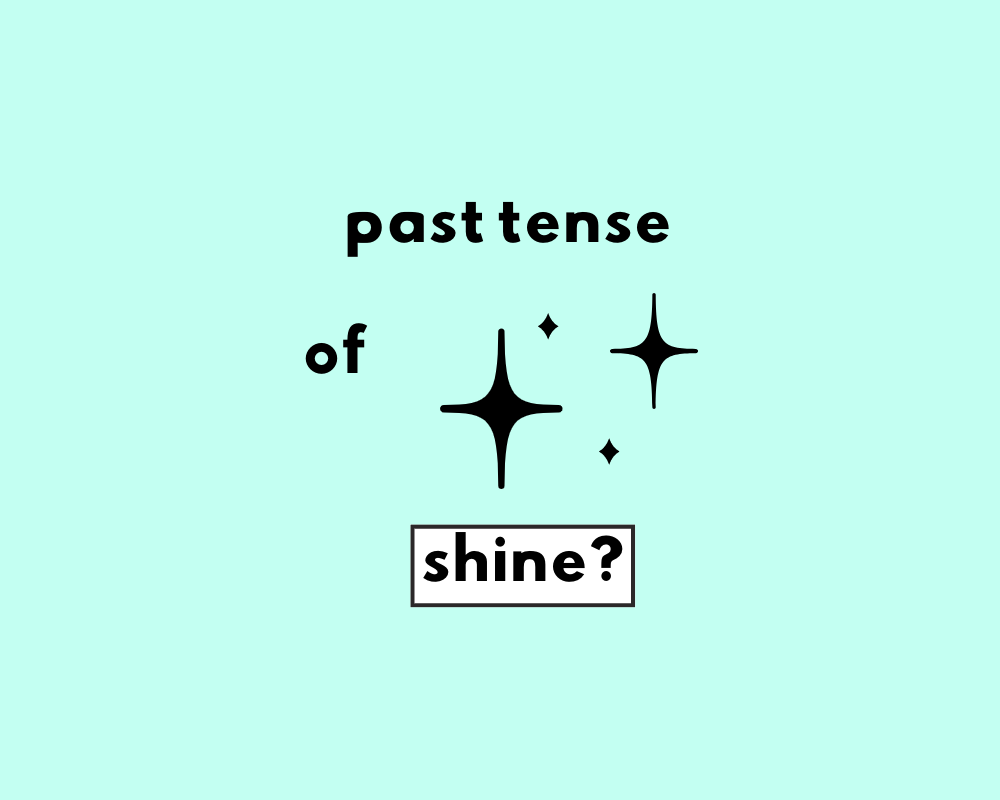Contents
Toggle
What’s the past tense of “shine”?
Let’s shine a light on this grammar question: what’s the past tense of the verb, to shine? As explained by the Chicago Manual of Style, the past tense of shine, as in, ‘to give or make light” which is intransitive, is shone. The transitive verb, to shine, describes when a thing is caused to shine (and therefore takes on a sentence object). The past tense here is shined.
When to use shined vs. shone
The intransitive verb, shine, defined by the Oxford Learner’s dictionary as, “to produce or reflect light; to be bright”. As a transitive verb, to shine means “to aim or point the light of a lamp, etc. in a particular direction”.

1. Shine is present tense: I can shine the light on the road so he can see. (third-person present singular)
2. Shone/shined is the simple past: The sun shone brightly in a cloudless sky.
3. Shining is the present participle: A light was shining in the distance.
4. Shines is third-person present singular: He shines the light on the road so he can see.
5. Shone/shined is also the past participle: When I first bought it, my car had shone like a glowing star.
Shined/shone past tense vs. past perfect/continuous
With participle forms of verbs, use the helper verbs have/had. With the simple past tense, auxiliaries are omitted and the verb stands on its own to reflect tense.
Past tense: The doctor shone the light in my eyes several times.
Past participle: He had shined the flashlight on the campfire to see whether it was burning.
Examples of the simple present tense z, shine
1. These qualities shine forth in all that he produced.
2. A light was shining in the distance. (present participle)
3. The stars were shining and the moon was bright. (present participle)
4. He failed to shine academically but he was very good at sports.
5. She has set a shining example of loyal service over four decades.
Examples of shone/shine (simple past tense)
1. The sun shone brightly in a cloudless sky.
2. He shined shoes and sold newspapers to make money.
3. The hot desert sun shone down relentlessly.
4. The watchman shone his torch at us.
5. The doctor shone the light in my eyes several times.
Examples of the participle shined/shone
1. He had shined the flashlight on the campfire to see whether it was burning.
2. When I first bought it, my car had shone like a glowing star.
3. She had shined the penlight on the bottom paragraph so the students could read the text.
4. David has really shone in his role as team captain.
5. I loved how the light shone through the stained-glass window before it got smashed.
Origin of the verb shine
From etymology online on shine (v.):
Middle English shinen, from Old English scinan “shed, send forth, or give out light; be radiant, be resplendent, illuminate,” of persons, “be conspicuous”.
Other commonly confused verb tenses
- What’s the past tense of spread?
- What’s the past tense of lead?
- What’s the past tense of choose?
- What’s the past tense of fly?
- What’s the past tense of lay?
- What’s the past tense of drive?
- What’s the past tense of draw?
Learn more about verbs
- What are regular and irregular verbs?
- Transitive and intransitive verbs?
- What are verbs?
- What’re personal pronouns?
- What’s the difference between they’re, their, and there?
- Whose vs who’s?
Sources
1. Harper, Douglas. “Etymology of shine.” Online Etymology Dictionary, https://www.etymonline.com/word/shine. Accessed 16 April, 2023.










